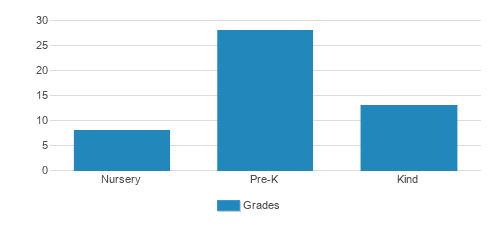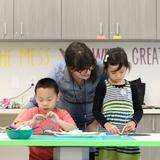Rainbow Montessori School's program is based on a unique balance between the benefits of the Montessori method and the ideals of traditional nursery school.
RMS accepts children ages PK 2 1/2 through full day Kindergarten.
Our classes are grouped by age, with a great teacher /child ration (maximum 14 children with 2 teachers for older students, 8:2 ration for the 2 1/2 class). In addition to a full Montessori program, we offer weekly yoga classes, filed trips, arts programs.
Before and Aftercare are available. We invite you to come in for a tour to see our wonderful school. Please call us for an appointment.
Quick Stats (2025)
- School Type: Montessori School
- Grades: Prekindergarten-Kindergarten
- Enrollment: 53 students
- Average class size: 12 students
- Application Deadline: None / Rolling
- Source: Verified school update
School Overview
School Type
Religious Affiliation
Grades Offered
Grades Prekindergarten-Kindergarten
Year Founded
1981
Student Body
Total Students
53 students
Student Body Type
Co-ed
% Students of Color
20%
State avg.: 39%
Students by Grade

Academics and Faculty
Total Classroom Teachers
1 teacher
% Faculty w/Advanced Degree
55%
Average Class Size
12 students
Classroom Dress Code
Casual
Tuition and Acceptance Rate
Admission Deadline
None / Rolling
Tuition Notes
Tuition may be paid monthly, quarterly or annually.
Extracurriculars
Total ExtracurricularsTotal Extra-curric.
5 extracurriculars
ExtracurricularsExtra-curric.
Club or Organization:
Reading Enrichment
Arts and Music Programs:
Art, Cooking, Dance, Music
Reading Enrichment
Arts and Music Programs:
Art, Cooking, Dance, Music
School Notes
- Students do not need to be toilet trained to attend.
Source: Verified school update
Frequently Asked Questions
When is the application deadline for Rainbow Montessori?
The application deadline for Rainbow Montessori is rolling (applications are reviewed as they are received year-round).
School Reviews
Endorse Rainbow Montessori. Endorsements should be a few sentences in length. Please include any comments on:
- Quality of academic programs, teachers, and facilities
- Availability of music, art, sports and other extracurricular activities
- Academic or athletic awards
Recent Articles

A Parent's Guide To Understanding High School Teaching Methods
This comprehensive guide helps parents navigate the various teaching methods used in today's high school classrooms. By understanding these approaches, you'll be better equipped to support your teen's learning journey, communicate effectively with teachers, and create a complementary learning environment at home.

February 08, 2025
Social Emotional Learning: Education's Hidden SymphonyA musician's perspective on Social Emotional Learning reveals how this educational framework orchestrates success through five essential emotional competencies.

January 24, 2025
A Roadmap For Starting A Private SchoolUse this roadmap as a set of talking points with your trusted mentors and professionals to start the private school of your dreams. You're not alone. Over the years, hundreds of folks like you have had the same dream. From Quintilian to Maria Montessori to Lucy Madeira Wing, visionary educators have established schools to teach according to their beliefs and methodologies.



















